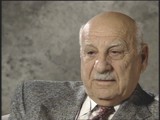You searched for: poland
<< Previous | Displaying results 71-80 of 1567 for "poland" | Next >>
-
Wilek (William) Loew describes refugees from western Poland after their arrival in Soviet-occupied Lvov
Oral HistoryWilek was the son of Jewish parents living in the southeastern Polish town of Lvov. His family owned and operated a winery that had been in family hands since 1870. Wilek's father died of a heart attack in 1929. Wilek entered secondary school in 1939. Soon after he began school, World War II began with the German invasion of Poland. Lvov was in the part of eastern Poland annexed by the Soviet Union. Although the Soviets took over Wilek's home and the family business, Wilek was able to continue his…

-
Antisemitic poster published in German-occupied Poland in March 1941.
PhotoAn antisemitic poster published in German-occupied Poland in March 1941. The caption reads, "Jews are lice; They cause typhus." This German-published propaganda poster was intended to instill fear of Jews among Christian Poles.
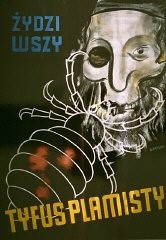
-
Morton Goldberg describes fleeing from Soviet-occupied Poland to Vilna in 1939
Oral HistoryWhen the Soviet Union invaded eastern Poland in September 1939, Martin fled from the Soviet zone of occupied Poland to Vilna. He stayed there for about nine months and then moved to a small town about two hours from Vilna. The Soviets occupied Lithuania in 1940. Using forged identity documents, Martin obtained a visa for transit through Japan. He left Lithuania, traveling east along the Trans-Siberian Railroad to Vladivostok. There he boarded a ship for Japan. Martin remained in Japan until the fall of…
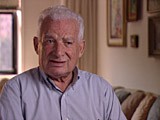
-
Susan Bluman describes fleeing to Vilna after the occupation of Poland
Oral HistorySusan was 19 years old when Germany invaded Poland in September 1939. Her boyfriend, Nathan, was in Lvov when the Soviet Union occupied eastern Poland. Nathan sent a guide to Warsaw to bring Susan to the Soviet zone of occupied Poland. Her parents reluctantly agreed after Susan promised to return to Warsaw within two weeks. Upon her arrival in Lvov, Susan married Nathan. The couple then fled across the Lithuanian border to Vilna, where they stayed for a year. They received a visa for transit through Japan…
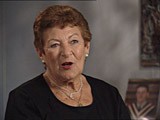
-
Blanka Rothschild describes antisemitic regulations in occupied Lodz, Poland
Oral HistoryBlanka was an only child in a close-knit family in Lodz, Poland. Her father died in 1937. After the German invasion of Poland, Blanka and her mother remained in Lodz with Blanka's grandmother, who was unable to travel. Along with other relatives, they were forced into the Lodz ghetto in 1940. There, Blanka worked in a bakery. She and her mother later worked in a hospital in the Lodz ghetto, where they remained until late 1944 when they were deported to the Ravensbrueck camp in Germany. From Ravensbrueck,…
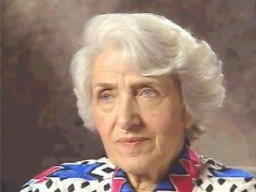
-
Sophie Turner-Zaretsky describes living conditions while in hiding in Poland
Oral HistorySophie was born Selma Schwarzwald to parents Daniel and Laura in the industrial city of Lvov, two years before Germany invaded Poland. Daniel was a successful businessman who exported timber and Laura had studied economics. The Germans occupied Lvov in 1941. After her father's disappearance on her fifth birthday in 1941, Sophie and her mother procured false names and papers and moved to a small town called Busko-Zdroj. They became practicing Catholics to hide their identities. Sophie gradually forgot that…
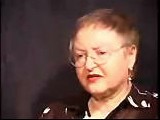
-
Frank Bleichman describes conditions in and dangers facing a partisan camp in the forests of Poland
Oral HistoryFrank was one of seven children born to a religious Jewish family in Kamionka, in the Lublin district of Poland. Germany invaded Poland in September 1939. When deportations of Jews from the Lublin area began in 1942, Frank joined a group of Jewish partisans who roamed the forests in search of weapons and food. After obtaining weapons by posing as Soviet paratroopers, they were able to defend themselves against German raids and take revenge against collaborators. They gradually made connections with Polish…
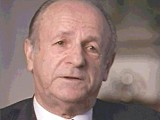
-
Blanka Rothschild describes the beginning of the German invasion of Poland when she and her family were in Lodz
Oral HistoryBlanka was an only child in a close-knit family in Lodz, Poland. Her father died in 1937. After the German invasion of Poland, Blanka and her mother remained in Lodz with Blanka's grandmother, who was unable to travel. Along with other relatives, they were forced into the Lodz ghetto in 1940. There, Blanka worked in a bakery. She and her mother later worked in a hospital in the Lodz ghetto, where they remained until late 1944 when they were deported to the Ravensbrueck camp in Germany. From Ravensbrueck,…
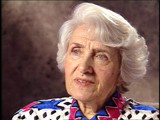
-
Aron (Dereczynski) Derman describes events that took place upon the German invasion of Slonim, Poland
Oral HistoryAron was born to a middle-class Jewish family in Slonim, a part of Poland between the two world wars. His parents owned a clothing store. After studying in a technical school, Aron worked as a motion-picture projectionist in a small town near Slonim. The Soviet army took over Slonim in September 1939. War broke out between Germany and the Soviet Union in June 1941. Aron returned to Slonim. The Germans soon occupied Slonim, and later forced the Jews into a ghetto. Aron was forced to work in an armaments…
